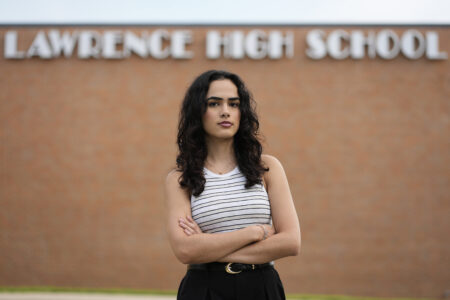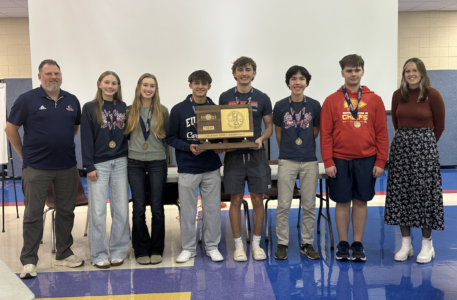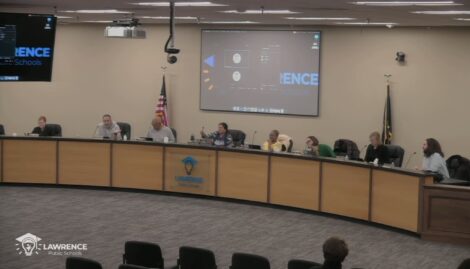Lawrence school district sued in federal court for use of AI-powered surveillance system; students claim Gaggle results in illegal searches

photo by: AP Photo/Charlie Riedel)
Natasha Torkzaban stands outside Lawrence High School, where she and other students have filed a lawsuit against the school district's use of digital surveillance software, Sunday, Aug. 3, 2025.
A group of current and former students is suing the Lawrence school district in federal court, alleging the district is using software technology to illegally conduct “drag-net searches and seizures” of the students’ digital files.
The federal lawsuit filed earlier this month challenges the district’s 2023 decision to use a third-party artificial intelligence-powered software service called Gaggle to monitor student usage of district-issued computers. As the Journal-World reported, the district began using the service in November 2023 in an effort to “help protect K-12 students against self-harm, bullying, and threats of violence.”
But nine current and former students — including several staff members of the district’s student newspapers — allege the program instead is violating their First Amendment rights and resulting in illegal searches of digital files they produce.
The lawsuit, which is seeking a jury trial and monetary damages, alleges the school district is “engaged in drag-net searches and seizures of all students’ protected expression without any suspicion that students are violating the law or school rules or engaging in any sort of wrongdoing whatsoever.”
Lawrence school board President G.R. Gordon-Ross and Superintendent Jeanice Swift both told the Journal-World that they would not comment on pending litigation.
In addition to the lawsuit, The Associated Press conducted a review of the Lawrence school district’s Gaggle system as part of a national investigation into AI surveillance systems in schools.
Gaggle alerted the Lawrence school district to more than 1,200 incidents in a recent 10-month period. But almost two-thirds of those alerts were deemed by school officials to be nonissues — including over 200 false alarms from student homework, according to an Associated Press analysis of data received via a public records request.
Students in one photography class were called to the principal’s office over concerns Gaggle had detected nudity. The photos had been automatically deleted from the students’ Google Drives, but students who had backups of the flagged images on their own devices showed it was a false alarm. District officials said they later adjusted the software’s settings to reduce false alerts.
Natasha Torkzaban, a 2024 graduate who is a plaintiff in the lawsuit, said she was flagged for editing a friend’s college essay because it had the words “mental health” in it.
“I think ideally we wouldn’t stick a new and shiny solution of AI on a deep-rooted issue of teenage mental health and the suicide rates in America, but that’s where we’re at right now,” Torkzaban said.
Students in multiple other districts across the country are facing similar issues, the AP investigation found.
Surveillance systems in American schools increasingly monitor everything students write on school accounts and devices. Thousands of school districts across the country use software like Gaggle and Lightspeed Alert to track kids’ online activities, looking for signs they might hurt themselves or others. With the help of artificial intelligence, technology can dip into online conversations and immediately notify both school officials and law enforcement.
Educators say the technology has saved lives. But critics warn it can criminalize children for careless words.
“It has routinized law enforcement access and presence in students’ lives, including in their home,” said Elizabeth Laird, a director at the Center for Democracy and Technology.
In a country weary of school shootings, several states have taken a harder line on threats to schools. Among them is Tennessee, which passed a 2023 zero-tolerance law requiring any threat of mass violence against a school to be reported immediately to law enforcement.
There, a 13-year-old girl was arrested in August 2023 after she had been texting with friends on a chat function tied to her school email at Fairview Middle School, which uses Gaggle to monitor students’ accounts. (The Associated Press is withholding the girl’s name to protect her privacy. The school district did not respond to a request for comment.)
Taken to jail, the teen was interrogated and strip-searched, and her parents weren’t allowed to talk to her until the next day, according to a lawsuit they filed against the school system. She didn’t know why her parents weren’t there.
“She told me afterwards, ‘I thought you hated me.’ That kind of haunts you,” said Lesley Mathis, the girl’s mother.
Mathis has acknowledged her daughter’s comments were wrong, but also has argued that context clearly showed the comments were not a threat.
“It made me feel like, is this the America we live in?” Mathis said of her daughter’s arrest. “And it was this stupid, stupid technology that is just going through picking up random words and not looking at context.”
A court ordered eight weeks of house arrest, a psychological evaluation and 20 days at an alternative school for the girl.
Gaggle’s CEO, Jeff Patterson, said in an interview that the school system did not use Gaggle the way it is intended. The purpose is to find early warning signs and intervene before problems escalate to law enforcement, he said.
“I wish that was treated as a teachable moment, not a law enforcement moment,” said Patterson.
In Lawrence, the federal lawsuit alleges students had creative works and other forms of expression illegally taken from them, among other allegations.
“Soon after the District launched Gaggle, the creative contents of numerous art, journalism, and photography students were flagged, many of those students were interrogated, and their original images were removed,” the lawsuit alleges. “Although the flagged artwork did not contain nudity or violate school policy in any way, student work was seized without warning. Students discovered their files were missing only after comparing school accounts to personal backups. One student was compelled to describe every image in her art portfolio to school administrators. Students recovered their seized work only after months of advocacy.”
In addition, the lawsuit alleges the Gaggle system disrupted the work of staff members at The Budget and the Free Press, the student publications of Lawrence High and Free State High. The lawsuit also alleges the Gaggle system is particularly problematic for students who may be seeking mental health care.
The lawsuit alleges “when students use their school-issued accounts to seek help or report concerns — particularly about mental health — Gaggle frequently intercepts and seizes those communications before they can reach their intended recipients, including teachers, counselors, and even parents.”
Plaintiffs in the lawsuit are listed as Torkzaban, Jack Tell, Morgan Salisbury, Opal Morris, Henry Farthing, Suzana Kennedy, Naomi Sui Pang, and two minors who are suing through their parents, Dave and Hannah Tell and Margaret Weisbrod Morris and Jonathan Morris.
The suit was filed by attorneys Mark Johnson, Harrison Rosenthal, and Jacob Margolies with the Kansas City, Mo., law firm Dentons US
The lawsuit does not seek a specific amount of monetary damages, but rather asks the court to award “compensatory, nominal and punitive damages.” The lawsuit also seeks a permanent injunction that would stop the district from using Gaggle in the future.
— Associated Press reporter Sharon Lurye contributed to this article.







